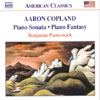Copland Piano Fantasy; Piano Sonata; Piano Variations
Fiery performances in a bargain set of three notable Copland works
View record and artist detailsRecord and Artist Details
Composer or Director: Aaron Copland
Genre:
Instrumental
Label: Naxos
Magazine Review Date: 8/2005
Media Format: CD or Download
Media Runtime: 63
Mastering:
Stereo
DDD
Catalogue Number: 8 559184

Tracks:
| Composition | Artist Credit |
|---|---|
| Piano Fantasy |
Aaron Copland, Composer
Aaron Copland, Composer Benjamin Pasternack, Piano |
| Sonata for Piano |
Aaron Copland, Composer
Aaron Copland, Composer Benjamin Pasternack, Piano |
| Variations |
Aaron Copland, Composer
Aaron Copland, Composer Benjamin Pasternack, Piano |
Author: Lawrence Johnson
Aaron Copland’s three major piano works span the most productive decades of his life, taking us from the austere rigour of the 1930 Variations to the Sonata’s lyric introspection and the epic visionary scale of the 1957 Fantasy.
Benjamin Pasternack shows a clear ease and affinity. In the Variations he brings out the tensile angular beauty and surely assays the shifts from withdrawn solace to rhythmic swagger. Though the bravura sections are rendered more as a toccata-like scherzo than with high-flying virtuosity, he plays with command and force. The close balance emphasises the shallow piano but provides a keen, edgy brilliance, suiting Copland’s preference for a sound that is ‘lean, percussive and rather harmonically severe’.
Pasternack is also in sync with the Sonata’s taut poetry, moving fluidly from cool austerity to bursts of agitated virtuosity. Some of his Molto moderato seems literal and unfocused, yet the ensuing acceleration goes with plenty of syncopated verve. He shows fine sensitivity in the searching Andante finale, though the brusque fractional impatience doesn’t relax enough to convey the hopeful expectancy so key to Copland’s world. The Fantasy originated in sketches for a second concerto planned for William Kapell. Again, the nostalgic pages could benefit from a lighter touch and more spacious approach, yet Pasternack keeps firm forward momentum and interest aloft over the long span.
On the whole, Pasternack’s brawny performances have the requisite fire and responsiveness and this Naxos disc offers a notable and economical way of picking up all three fascinating Copland works.
Benjamin Pasternack shows a clear ease and affinity. In the Variations he brings out the tensile angular beauty and surely assays the shifts from withdrawn solace to rhythmic swagger. Though the bravura sections are rendered more as a toccata-like scherzo than with high-flying virtuosity, he plays with command and force. The close balance emphasises the shallow piano but provides a keen, edgy brilliance, suiting Copland’s preference for a sound that is ‘lean, percussive and rather harmonically severe’.
Pasternack is also in sync with the Sonata’s taut poetry, moving fluidly from cool austerity to bursts of agitated virtuosity. Some of his Molto moderato seems literal and unfocused, yet the ensuing acceleration goes with plenty of syncopated verve. He shows fine sensitivity in the searching Andante finale, though the brusque fractional impatience doesn’t relax enough to convey the hopeful expectancy so key to Copland’s world. The Fantasy originated in sketches for a second concerto planned for William Kapell. Again, the nostalgic pages could benefit from a lighter touch and more spacious approach, yet Pasternack keeps firm forward momentum and interest aloft over the long span.
On the whole, Pasternack’s brawny performances have the requisite fire and responsiveness and this Naxos disc offers a notable and economical way of picking up all three fascinating Copland works.
Discover the world's largest classical music catalogue with Presto Music.

Gramophone Digital Club
- Digital Edition
- Digital Archive
- Reviews Database
- Full website access
From £8.75 / month
Subscribe
Gramophone Full Club
- Print Edition
- Digital Edition
- Digital Archive
- Reviews Database
- Full website access
From £11.00 / month
Subscribe
If you are a library, university or other organisation that would be interested in an institutional subscription to Gramophone please click here for further information.




